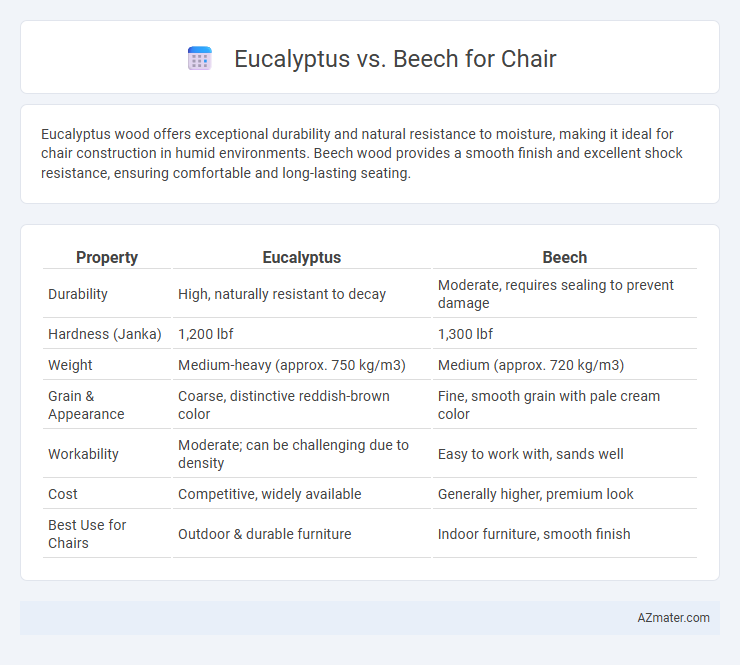Eucalyptus wood offers exceptional durability and natural resistance to moisture, making it ideal for chair construction in humid environments. Beech wood provides a smooth finish and excellent shock resistance, ensuring comfortable and long-lasting seating.
Table of Comparison
| Property | Eucalyptus | Beech |
|---|---|---|
| Durability | High, naturally resistant to decay | Moderate, requires sealing to prevent damage |
| Hardness (Janka) | 1,200 lbf | 1,300 lbf |
| Weight | Medium-heavy (approx. 750 kg/m3) | Medium (approx. 720 kg/m3) |
| Grain & Appearance | Coarse, distinctive reddish-brown color | Fine, smooth grain with pale cream color |
| Workability | Moderate; can be challenging due to density | Easy to work with, sands well |
| Cost | Competitive, widely available | Generally higher, premium look |
| Best Use for Chairs | Outdoor & durable furniture | Indoor furniture, smooth finish |
Introduction to Eucalyptus and Beech Wood
Eucalyptus wood, known for its durability and attractive grain, offers a sustainable option for chair construction due to its fast growth and resistance to decay. Beech wood is prized for its fine, tight grain and smooth texture, providing excellent strength and stability ideal for ergonomic and stylish chair designs. Both woods present unique characteristics, with Eucalyptus excelling in outdoor settings and Beech favored for indoor furniture due to its workability and finish quality.
Botanical Overview: Eucalyptus vs. Beech
Eucalyptus wood, derived from fast-growing evergreen trees native to Australia, features a dense, durable grain with a natural resistance to moisture and insects, making it ideal for outdoor and indoor chair construction. In contrast, Beech wood comes from deciduous trees predominantly found in Europe and North America, characterized by a fine, tight grain and pale, consistent color that offers exceptional workability and a smooth finish for fine furniture like chairs. Both woods have distinct botanical traits influencing their strength, texture, and suitability for different chair designs and environments.
Physical Properties: Strength and Durability
Eucalyptus wood exhibits high density and natural oils that enhance its strength and resistance to wear, making it exceptionally durable for chair construction. Beech wood is known for its fine grain and hardness, offering excellent shock resistance and stability under pressure, which contributes to long-lasting furniture. Both woods provide robust physical properties, but eucalyptus's natural oils give it superior moisture resistance compared to beech.
Workability: Ease of Crafting Chairs
Eucalyptus wood offers excellent workability for crafting chairs due to its medium density and fine grain, allowing smooth cutting and shaping with minimal effort. Beech wood is highly favored for chair making because of its uniform texture and strength, facilitating precise carving and sanding while resisting splintering. Both species provide strong durability, but beech's superior shock resistance and stability often result in longer-lasting, finely crafted chairs.
Aesthetic Appeal: Color and Grain Comparison
Eucalyptus wood offers a warm, rich color palette ranging from golden brown to deep reddish hues, characterized by a smooth, consistent grain that enhances modern and rustic chair designs. Beech wood features a pale cream to light reddish-brown tone with a fine, straight grain pattern, providing a clean and classic look favored in traditional and Scandinavian-style furniture. The choice between eucalyptus and beech for chairs depends on the desired aesthetic impact, with eucalyptus emphasizing bold warmth and beech highlighting subtle elegance.
Environmental Impact and Sustainability
Eucalyptus wood is highly sustainable due to its rapid growth rate and efficient carbon sequestration, making it an eco-friendly choice for chair manufacturing. Beech, while durable and strong, grows more slowly and requires selective harvesting, which can impact forest biodiversity if not managed responsibly. Choosing eucalyptus supports renewable forestry practices and reduces environmental footprints compared to the traditionally harvested beech.
Cost Factors and Availability
Eucalyptus wood typically offers a more cost-effective option for chair manufacturing due to its faster growth rate and widespread availability, especially in regions like Australia and the southern United States. Beech wood, known for its durability and fine grain, commands a higher price point because of its slower growth and limited supply primarily in Europe and North America. The availability of eucalyptus ensures lower material costs and easier sourcing, whereas beech's premium price reflects its quality and restricted regional presence.
Maintenance and Longevity in Chairs
Eucalyptus wood offers high natural oil content that resists moisture and decay, making it easier to maintain and ideal for chairs exposed to varying humidity levels. Beech wood, while durable and strong, requires regular sealing or finishing to prevent absorption of moisture and potential warping, demanding more maintenance over time. Chairs crafted from eucalyptus typically exhibit longer longevity in outdoor or humid indoor settings due to their enhanced resistance to environmental wear and insect damage.
Best Uses: Indoor vs. Outdoor Chair Applications
Eucalyptus wood is highly resistant to moisture and decay, making it an excellent choice for outdoor chair applications where durability against weather elements is crucial. Beech wood, with its fine grain and smooth finish, is better suited for indoor chairs, providing stability and comfort in controlled environments. Choosing eucalyptus enhances outdoor furniture longevity, while beech offers superior aesthetics and workability for indoor seating.
Conclusion: Choosing Between Eucalyptus and Beech
Eucalyptus offers a durable, water-resistant option with a distinctive grain ideal for outdoor chairs, while beech provides a smooth, fine texture perfect for indoor seating with excellent strength and workability. Selecting between eucalyptus and beech depends on the chair's intended use, exposure to moisture, and aesthetic preference. For outdoor durability, eucalyptus is preferable, whereas beech suits refined indoor environments demanding elegant finishes.

Infographic: Eucalyptus vs Beech for Chair
 azmater.com
azmater.com